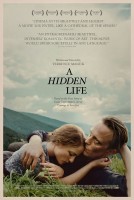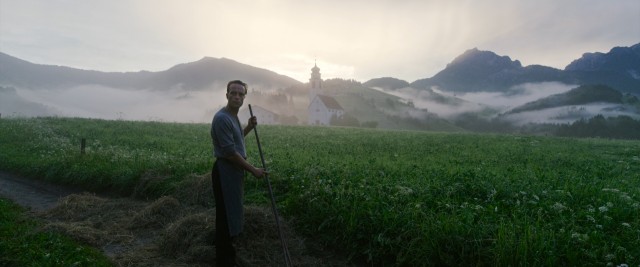A Hidden Life Movie Review
 |
A Hidden Life
Theatrical Release: December 13, 2019 / Running Time: 173 Minutes / Rating: PG-13 Writer/Director: Terrence Malick Cast: August Diehl (Franz Jägerstätter), Valerie Pachner (Fani Jägerstätter), Maria Simon (Resie Schwaninger), Tobias Moretti (Fr. Ferdinand Fürthauer), Bruno Ganz (Judge Lueben), Matthias Schoenaerts (Captain Herder), Karin Neuhäuser (Rosalia Jägerstätter), Ulrich Matthes (Lorenz Schwaninger), Franz Rogowski (Waldland), Karl Markovics (Mayor Kraus), Michael Nyqvist (Bishop Fliesser), Wolfgang Michael (Eckinger), Martin Wuttke (Major Kiel) |
The 2010s have been writer-director Terrence Malick's most productive decade to date, but since his 2011 triumph The Tree of Life, Malick's output has failed to find audiences or even many admiring critics. Despite their mainstream star power, Happily, Malick's latest, A Hidden Life, represents something of a return to form for the legendary recluse, though it remains to be seen whether this epic drama brings its maker the acclaim and arthouse-strong viewership of hits like Tree, The Thin Red Line, and Badlands.
Hidden is a World War II film and if any one historical topic has been exhausted by filmmakers, it is World War II. Fortunately, Malick's film is not like the other WWII dramas you're familiar with. It avoids combat altogether to tell the true story of an Austrian farmer who did just that by objecting to the war on moral grounds.
Opening in 1939 with text explaining how all Austrians were called upon to sign an oath to Hitler, the film quickly acclimates us to Franz Jägerstätter (August Diehl) and his wife Franziska (Valerie Pachner). The two work hard in the fields to provide for their three young daughters in the scenic mountains of St. Radegund, Austria. Unlike most of the rest of the small rural community, Franz does not believe in the war that Germany is fighting and wants no part of it.
The hope is that he'll avoid being called up and, for a while, he is. But Franz's stance becomes clear when he won't donate to the cause or accept stipends from the Nazis. He discusses his dilemma with his priest, who refers him to the local bishop. Neither of them provides much clarity in their advocation of moral compromise, but Franz holds steadfast and winds up in a small prison when he shows up but won't fall in line.
Franz's actions make Franziska a pariah in the community and both husband and wife worry about their family's future. He is given many opportunities and urgings to tell the Germans what they want, even if that's not what he believes in his heart. But you do get the feeling that Terrence Malick wouldn't be making a movie about the Jägerstätters in 2019 if Franz was willing to budge.
If you've seen any Malick film, then you know that they are a sensory experience. Hidden adds to the director's legacy for cinematic art with some of the most beautiful and striking cinematography of the year. The director's appreciation of nature is no secret, but it's quite contagious when you're getting immersed in glorious, vibrant European vistas captured spectacularly by longtime Steadicam operator turned clearly qualified director of photography Jörg Widmer. Widmer makes use of everything from fisheye lenses to first-person point-of-view shots, always tastefully and often breathtakingly. There's even some disarming period-appropriate home movie footage of Hitler.
Malick also uses sound to great effect, from playing with the volume of dialogue to making the most of an exquisite James Newton Howard score. Most of the film is in English and when it's not, it isn't subtitled. Clearly, the filmmaker knows the value of letting viewers figure out what's going on. Fortunately, that isn't the tall order it was on Malick's last few films. Tied to all the visual and aural beauty is a clear, coherent, and compelling narrative. Jägerstätter's story is one worth telling and one most viewers will not have heard before, even if he was declared a martyr by Pope Benedict XVI and beatified in 2007.
Another filmmaker might overplay the religious aspect of Jägerstätter, but as usual Malick is able to present Christian themes without preaching or proselytizing. This film is more akin to Martin Scorsese's Silence than the typically amateurish Christian movies that court churchgoers and disregard regular moviegoers.
Of course, Malick's film could very well be headed for the same commercial disappointment that befell that 2016 Scorsese passion project. It doesn't help that Hidden runs nearly three hours long. While it is a bit of an endurance challenge just to watch, you can only imagine what it was like to make. Malick films are notoriously grand in scope and ambition, with productions that last for years only to be followed by a postproduction period as long or longer. Millions of feet of footage are shot, with Malick historically removing entire storylines and characters in the editing process. This one feels more focused and Hidden Life may well live up to its title when it opens today, seven months after premiering at Cannes. Although it is one of just two films that the often-decorated Fox Searchlight Pictures is campaigning for this awards season (the other being Taiki Waititi's more comedic World War II flick Jojo Rabbit), Malick's film feels like one that will get lost in the busy Christmastime shuffle and have to settle for no more than some technical nods. That's unfortunate, not because Malick is making his movies to win statuettes, but because an artistic undertaking of this order deserves to be seen and appreciated.
|
Related Reviews:
DVDizzy.com | DVD and Blu-ray Reviews | New and Upcoming DVD & Blu-ray Schedule | Upcoming Cover Art | Search This Site
DVDizzy.com Top Stories:
Now in Theaters: Marriage Story • The Irishman • Richard Jewell • A Beautiful Day in the Neighborhood • Waves • 1917 • Uncut Gems
Directed by Terrence Malick: The Tree of Life • The Thin Red Line • Song to Song • Knight of Cups • Badlands
Silence
Text copyright 2019 DVDizzy.com. Images copyright 2019 Fox Searchlight Pictures, Elizabeth Bay Productions, Aceway Productions, Mister Smith Entertainment, Studio Babelsberg.
Unauthorized reproduction prohibited.

